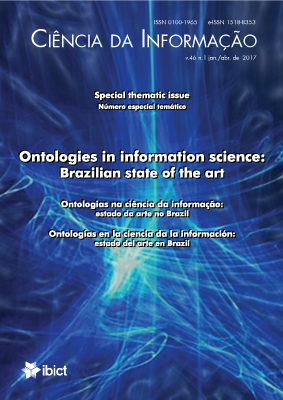Ontological approach to the normative dimension of organizations: an application of Documents Acts Ontology
DOI:
https://doi.org/10.18225/ci.inf.v46i1.4024Palavras-chave:
Corporations, Knowledge representation, Ontology, Social ontology, Document actsResumo
Modeling and knowledge representation are indispensable activities for developing information systems in the scope of modern corporations. In order to accomplish these activities, one should analyze a corporation both in terms of its physical structure and in terms its rules structure. The former we call here the descriptive dimension and the later prescriptive dimension. In this paper, we briefly discuss the descriptive dimension, and focus on the prescriptive dimension to explain the rights and obligations that corporations have to manage. After presenting background theories, we analyze the corporation through ontological principles taking advantage of theories of the so-called social ontology, namely, social acts, speech acts and document acts theory. The relevance of developing such analysis rests on the possibility of outlining a strong understanding of corporations by characterizing the nature of rights and duties obligations connected to corporative processes using Basic Formal Ontology (BFO) and Documents Acts (D-acts) Ontology. In doing this, we introduce a formal framework suitable to be applied in information systems working in the context of modern technologies like the Semantic Web.Downloads
Os dados de download ainda não estão disponíveis.
Downloads
Publicado
28/12/2017
Edição
Seção
Parte II - Aplicações e usos de ontologias na ciência da informação
Licença
- A publicação se reserva o direito de efetuar, nos originais, alterações de ordem normativa, ortográfica e gramatical, com vistas a manter o padrão culto da língua, respeitando, porém, o estilo dos autores;
- As provas finais não serão enviadas aos autores;
- Os autores mantém os direitos totais sobre seus trabalhos publicados na revista Ciência da Informação, ficando sua reimpressão total ou parcial, depósito ou republicação sujeita à indicação de primeira publicação na revista, por meio da Licença Pública 4.0 Internacional Atribuição-CompartilharIgual
- Deve ser consignada a fonte de publicação original;
- As opiniões emitidas pelos autores dos artigos são de sua exclusiva responsabilidade;
- Cada autor receberá dois exemplares da revista, caso esteja disponível no formato impresso.





























